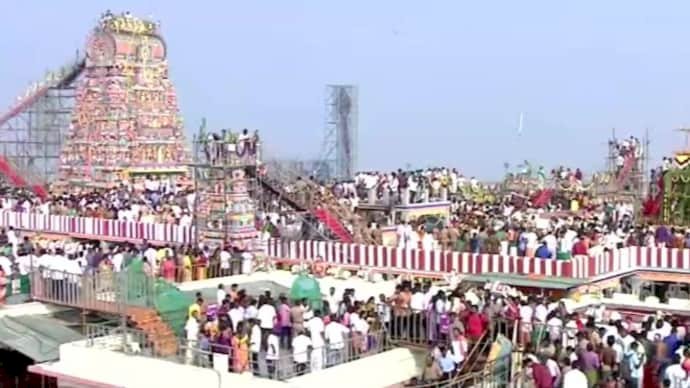Preserving Temple Sanctity: Madras High Court's Landmark Decision
In a noteworthy decision, the Madras High Court has instructed the Tamil Nadu Hindu Religious and Charitable Endowments department to prohibit the entry of non-Hindus beyond the 'Kodimaram' in all Hindu temples, asserting the sanctity of these places of worship. Emphasizing the fundamental right of Hindus to practice their religion without interference, the court highlighted instances where non-Hindus entered temples for non-religious purposes. To prevent such incidents, the court directed the installation of boards and required non-Hindus desiring to visit specific deities to provide an undertaking affirming their faith in Hinduism and willingness to abide by temple customs. Rejecting pleas to limit the order, the court insisted on its universal application to all Hindu temples, aiming to ensure communal harmony and peace. The decision underscores the importance of preserving religious sanctity while respecting diverse practices within society.
By Shreya Rajvanshi Gangal

In a significant decision, the Madras High Court has issued directives to the Tamil Nadu Hindu Religious and Charitable Endowments (HR&CE) department to prevent the entry of non-Hindus beyond the 'Kodimaram' (flagpole) area in all Hindu temples. The court emphasized that temples should not be treated as picnic spots or tourist attractions. Justice S Srimathy, presiding over the Madurai Bench of the Madras High Court, underscored the fundamental right of Hindus to practice their religion without interference. The ruling came in response to a plea filed by an individual seeking exclusive access for Hindus to the Arulmigu Palani Dhandayuthapani Swamy temple in Dindigul district.
Protecting Hindu Religious Practices:
The court's decision centres around safeguarding the rights of Hindus to freely practice their religion. Incidents were highlighted where non-Hindus allegedly entered temples for non-religious purposes, infringing upon the sanctity of these sacred spaces. The court stressed the need for temple administrations to uphold customs, practices, and agamas strictly.
Installation of Boards and Undertakings:
As a preventive measure, the Madras High Court directed the HR&CE department to install boards at temple entrances, near the flagpole, and other prominent locations, explicitly stating the restriction on non-Hindus beyond the 'Kodimaram'. Furthermore, if a non-Hindu wishes to visit a specific deity, they must provide an undertaking affirming their faith in Hinduism and a commitment to abide by temple customs.
"The respondents are directed not to allow non-Hindus who do not believe in the Hindu religion. Suppose any Non-Hindu claims to visit a particular deity in the temple. In that case, the respondents shall obtain an undertaking from the said non-Hindu that he has faith in the deity. He will follow thHindu religion's customs and practices andso abide by the temple customs and on such undertaking, the said non-Hindu may be allowed to visit the temple," the court ruled.
Applicability to All Hindu Temples:
Rejecting the plea to restrict the order to the Palani temple, the court insisted that the directive should apply uniformly to all Hindu temples. The objective is to ensure communal harmony and peace among different religious communities. The state government, the HR&CE department, and all individuals involved in temple administration are mandated to implement these directions in all Hindu temples.
Preserving Communal Harmony:
The court's decision emphasizes the importance of preserving communal harmony and respecting the diverse religious practices in society. Incidents such as treating temple premises as picnic spots and engaging in non-religious activities within sacred spaces were deemed as interference with the fundamental rights guaranteed to Hindus under the Constitution.
"It was also reported that in Arulmigu Brihadeeswarar Temple, a group of persons belonging to other religions had treated the temple premises as a picnic spot and had non-vegetarian food inside the temple premises. Likewise, recently, on 11.01.2024, a newspaper reported that a group of people belonging to another religion had entered the Arulmigu Meenakshi Sundareswarar Temple, Madurai with 'their sacred book' near the sanctorum and was attempting to do their prayers there."
Conclusion:
The Madras High Court's directive serves as a crucial step towards preserving the sanctity of Hindu temples and upholding the constitutional rights of Hindus to practice their religion freely. By extending the restrictions to all Hindu temples, the court aims to foster communal harmony and prevent activities that could undermine the religious sentiments of the Hindu community. The decision underscores the need for a balanced approach that respects the diverse religious landscape while ensuring the protection of sacred spaces.
What's Your Reaction?



















